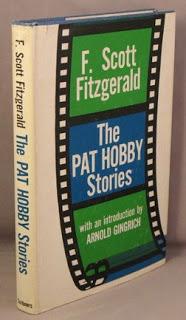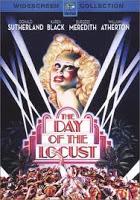Has Hollywood Really Changed?
Back a few months ago I had an ongoing dispute on the blog with someone who used the name/pseudonym "Jerry" who, after I described some actions I did on a series I worked on, said that I never got work after that because of my behavior and also, that "the industry has changed".Now I don't know who Jerry was and he/she wouldn't tell me, so I just stopped posting his/her comments and he/she gradually faded away (I think). But I did get work after that, preferring TV Movies to series and accumulating credits on 17 of them over the course of 14 years, not a bad record at all. And the most recent one will be shown in a month or so.
Which brings me to The Pat Hobby Stories.
 I had heard about the book but never read it. Simply, it's a collection of short stories about a down and out screenwriter in Hollywood who survives by hustling any writing jobs he can get. It's a great collection of stories about writing and what you have to do to survive in a business that rips your heart out some of the time and then praises you for a little bit to give you encouragement, only to be ripped up again.
I had heard about the book but never read it. Simply, it's a collection of short stories about a down and out screenwriter in Hollywood who survives by hustling any writing jobs he can get. It's a great collection of stories about writing and what you have to do to survive in a business that rips your heart out some of the time and then praises you for a little bit to give you encouragement, only to be ripped up again.In other words, it's Hollywood as it's always been.
But the twist here is this; it was written between 1939 and 1940. And it's author was none other than F. Scott Fitzgerald, who, by this time in his life, was Pat Hobby, living from rewrite jobs to whatever he could muster. His successes were behind him, The Great Gatsby would be re-discovered in the 1960's and Fitzgerald died at 44 in the same year.
And while I read the book, a collection of 17 stories, I wasn't surprised to find out something else.
It's the same today.
Nothing has really changed. We have computers, and Netflix and iPhones, but the business remains exactly the same. Exactly. I can only assume that Jerry doesn't know Hollywood history, maybe because he/she is young and full of their self. And that's perfectly normal. I'm not knocking younger writers, hell, I was one once.
There are a lot of movies about screenwriters, Bogart did one, William Holden did one, there are dozens of them out there, many you can still watch. And they all came before "The Player", the film most film students know of. And it was directed by Robert Altman who was 67 at the time.
 There's also Day of the Locust, a brilliant film with Donald Sutherland and based on a novel by Nathanael West in 1939 . I read the book and again was surprised by the similarities in the business. Sure, the cars were different but the stories and the lives of the people in it are still here today.
There's also Day of the Locust, a brilliant film with Donald Sutherland and based on a novel by Nathanael West in 1939 . I read the book and again was surprised by the similarities in the business. Sure, the cars were different but the stories and the lives of the people in it are still here today.And another great movie from the Coen Brothers Barton Fink, again a period piece about a screenwriter. And even Jeff Bridges was a screenwriter in Hearts of the West.
And there's one thing in common for all of them. The writer is always screwed. There's even a self-help book out called "The Writer Got Screwed (but didn't have to). Honest, there is. I have a copy of it, written by Brook Wharton.
And before you think I'm starting to whine, I'm not, I rarely got shafted but that's mostly because I did have the protection of the Guilds.
And as far as not being hired again I offer this story; I wrote a script called Maiden Voyage, about the takeover of a cruise ship. It was made by by the British Company Granada. They paid me for the script but not the story. I had written the script as a spec, and they should have also paid for the story, as well as the screenplay itself.
They refused to pay.
WGA said they had 5 days to pay.
An exec told my agent this; "this might sour us for using Jim in the future". My agent said he'd pass that information along to me.
They paid up, very upset at me and my agent.
One year later, I met the same exec at a party and he shook my hand and said the movie turned out great and that it was because of my terrific script.
And we would work together again.
Was this the same guy who threatened to make sure I'd never work in this town again?
My agent said the saying is really "you'll never work in this town again... or at least until we need you."
Know this; Hollywood never really changes, it's about the dreammakers and those who finance the dreammakers. It's about breaking in, surviving, falling out and maybe, if you're really persistent and lucky, breaking in again.
Just ask Manoel de Oliveira, the Portuguese film director who continues working at the tender age of 102.
